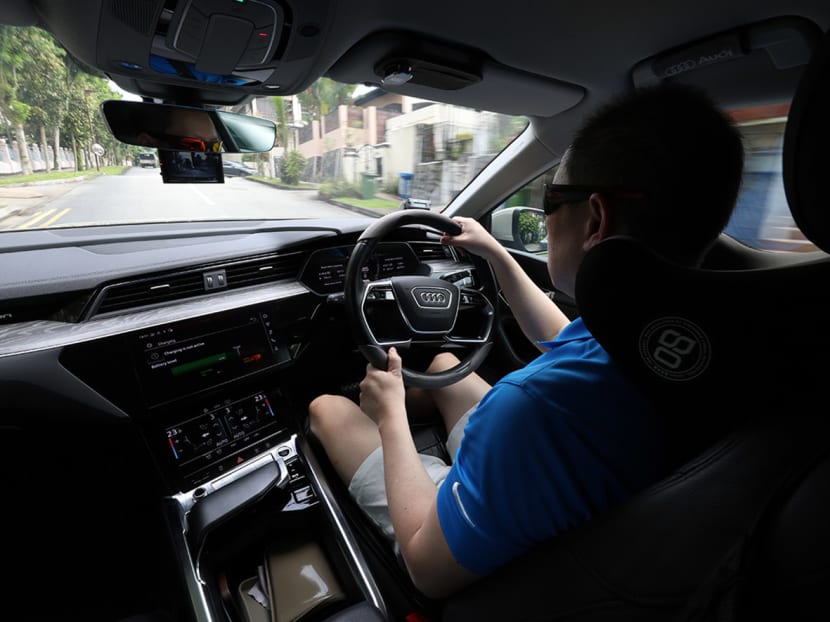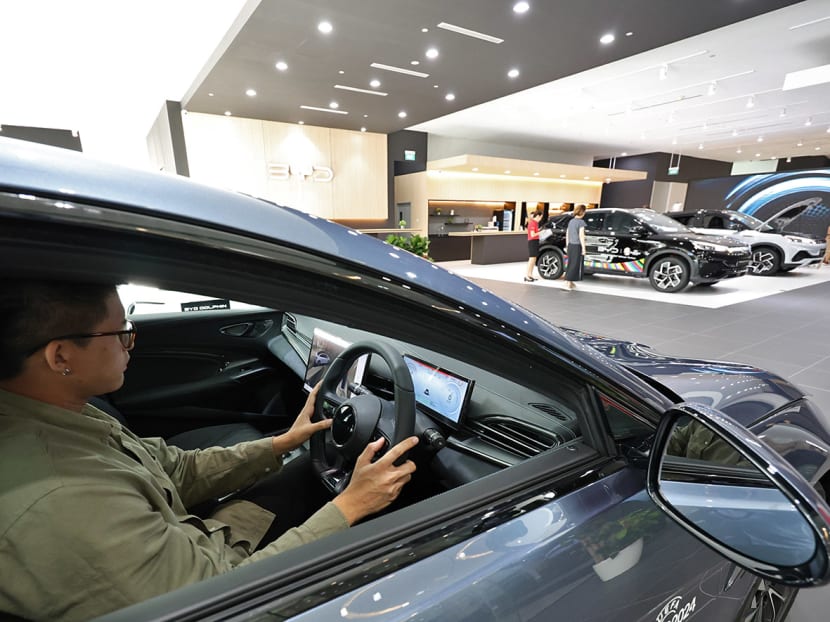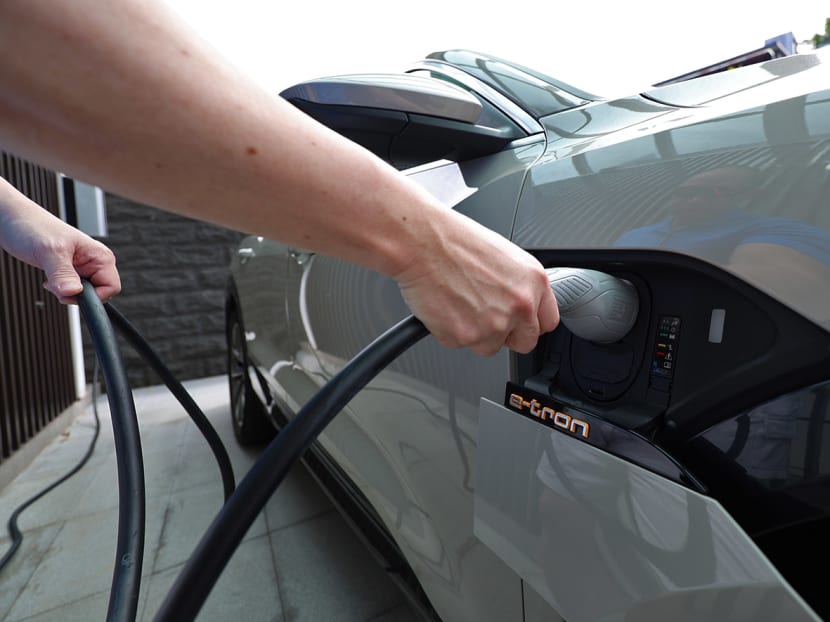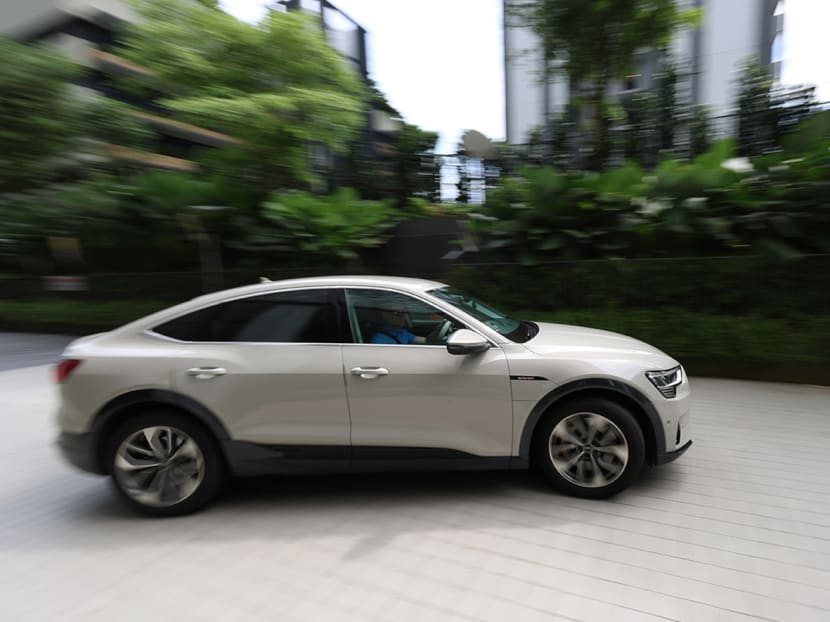The Big Read in short: With more EVs on the road, some drivers face a reality check
SINGAPORE — As the Certificate of Entitlement (COE) for his conventional Nissan car neared its expiry date, Mr Adrian Oh decided it was time to put his lingering idea of switching to an electric vehicle (EV) into action.


This audio is AI-generated.
Each week, TODAY’s long-running Big Read series delves into the trends and issues that matter. This week, we look at some teething issues faced by drivers of electric vehicles, as more of them are put on Singapore roads. This is a shortened version of the full feature, which can be found here.
- More motorists now opt for Electric Vehicles (EVs), amid Singapore's push to gradually phase out conventional ones that run on petrol or diesel
- EV users are typically drawn by the 'green' factor as well as potential savings on fuel costs
- However, lived experiences by some of them bore out various teething problems
- These include poor charging accessibility, range anxiety and even overall costs, EV drivers told TODAY
- However, experts caution against doling out more incentives to boost EV adoption and infrastructure, bearing in mind Singapore's aim to be a car-lite society
SINGAPORE — As the Certificate of Entitlement (COE) for his conventional Nissan car neared its expiry date, Mr Adrian Oh decided it was time to put his lingering idea of switching to an electric vehicle (EV) into action.
“We mainly wanted it for the sustainability factor, in terms of emissions on the road, as well as the stability in fuel prices compared to the more volatile petrol pump prices,” said the 58-year-old, who works in the manufacturing industry.
He also went a step further by installing a charging station at his landed home — which he described as a straightforward and rather affordable process costing around S$2,000 — after ordering a BYD electric car in June.
Mr Oh is among an increasing number of people in Singapore who are buying electric cars, as the Government dangles various carrots to prospective users and stakeholders to replace all internal-combustion engine vehicles with cleaner electric ones by 2040.
The move is part of the nation’s efforts to achieve its net-zero-emissions climate goal by 2050.
Existing Government measures to support this include grants and subsidies for drivers to switch to green cars, and a co-funding scheme for non-landed private property owners to install chargers.
For example, the EV Early Adoption Incentive provides a rebate of up to 45 per cent on the Additional Registration Fee — capped at S$15,000 — for fully electric cars and taxis. A Vehicular Emissions Scheme offers another S$25,000 for cars with zero tailpipe emissions, such as EVs. Both schemes are available until end 2025.
WHY IT MATTERS
EV motorists like Mr Oh are rising in numbers.
For the first five months of this year, about one-third of new car registrations here were electric ones — compared to almost one in five in 2023, and slightly above one in 10 in 2022.
Some industry experts attributed the surge to the availability of more mass market electric cars, apart from the existing government subsidies to incentivise early adoption of EVs.

Still, Singapore’s adoption rate of EVs is miles behind that of other countries. In Norway, for example — where efforts to encourage the use of EVs trace back to the 1990s — nine out of 10 new cars sold in January this year were battery electric cars, according to a report by news agency Reuters.
And despite the pick-up in interest here, electric models comprised just 1.8 per cent of the entire car population — or 11,941 of 651,302 — in 2023.
Analysts however suggested that this would not be the right metric to focus on because it naturally takes time to replace existing cars on the road with new ones.
But even as Singapore charges ahead with its EV plan, some drivers who have bought the cars are experiencing some pain points in their daily use.
Charging prices have been inching up — especially for shared chargers outside, said some users. Meanwhile, while the number of chargers continues to grow, so too have the number of EVs, compounding charger accessibility and range anxiety concerns.
As it stands, the growth in the number of EVs here has outpaced that of charging points over the last five years, based on figures from the Land Transport Authority and past media reports.
THE BIG PICTURE
While users are generally happy with their vehicle, some of these concerns mar their experience to some degree:
- Charging station near home
EV drivers who live in landed property have the choice to install their own charger. But given that landed property make up less than 5 per cent of homes here, this is a privilege afforded by only the very few.
Five of eight EV users whom TODAY spoke to live in condominiums and Housing and Development Board flats. They either have to contend with sharing a few chargers with many residents, or charging elsewhere if there is no charging station in their estate.
Charging rates outside tend to be more costly, due to mark ups levied by operators.
- Holdouts in condos
Installation of chargers at existing condominiums is subject to a vote by residents.
Even after getting over non-EV drivers’ hesitance over issues like having fewer non-EV parking lots, the process from residents’ approval to actual installation could take a long time.
Some operators said a bulk of the time is spent waiting on the government’s co-funding grant application approval.
- Costs & range
EVs are generally more expensive than their conventional car counterparts, though this concern has been addressed to a certain extent in recent years with the introduction of more mass-market EV models.
Analysts say the availability of such models could partly explain the recent surge in interest in such green four-wheelers.
But beyond the initial cost, users bemoan the long-term costs as well.
The price to charge an EV, while cheaper than refuelling a traditional car, has creeped up over the years. A full charge now can cost about S$10 more than about three years ago, according to some users.
In contrast, petrol prices have eased slightly from their record highs of over S$3.20 per litre in 2022 for 95-octane fuel to be under S$3 today.
EV drivers also gripe about the S$700 Additional Flat Component that they have to pay on top of the annual road tax, to partially cover the fuel excise duties paid by equivalent internal combustion engine vehicles.

Drivers also generally do not take the maximum distance range published by the car at face value.
While it is not a concern for an average user here, some drivers said the range anxiety is big enough a concern for them that they make it a point not to drive up to Malaysia — a pastime otherwise enjoyed by many Singaporeans.
THE BOTTOMLINE
Transport experts caution that while any prospective EV buyer would welcome more perks and subsidies, it would not be advisable for the authorities to rush into handing them out.
First, to stimulate the growth of the electric car population such that it outpaces that of EV chargers would only serve to make the perennial pain point of inaccessibility of charging more acute, they noted.
More importantly, EVs are meant to be a “lesser of two evils” sort of alternative to conventional cars with higher emissions, and a car-lite society with a well-connected public transport system is still Singapore's end goal.
Some experts also made comparisons to how automatic-transmission cars also took a while to gain popularity in the market here, saying that EVs, too, will eventually gain natural acceptance.
Assistant Professor Terence Fan from Singapore Management University said that ultimately, the sale of traditional internal combustion engine cars will stop by 2030.
So there is little cause to worry if people will be on board by then as they will “fall in line” regardless, he added.
However, he pointed out that since the aim of transitioning to EVs is to reduce emissions, it is important to look at the entire lifecycle emissions produced by the vehicles.
And on this count, he noted there are studies that show that EVs leave a larger carbon footprint in its production stage, and would take six to seven years of “intense” use to achieve parity with a traditional car in terms of overall emissions.

Does this mean that it is worth looking at a longer-term COE, for example, so that the cars can be on the road longer?
Not necessarily so, said the experts.
Asst Prof Fan said that if one were to reconsider the COE duration for EVs, the duration for other vehicles may need to be relooked too.
Other experts noted that while the current COE system has served Singapore relatively well, it is not perfect and has come with its own set of problems.
The 10-year validity period has also contributed to supply and price volatility, which led the Government to take a “cut and fill” approach recently to even out the quota supplies.
In all, any change to the COE system to prepare for an EV-focused Singapore would probably require a comprehensive relook, and not tweaks.
Meanwhile, for Mr Jason Lai, an electric car owner who lives in a condominium with no charger, he has to contend with driving elsewhere to charge his car and paying rising, marked-up prices as he does so.
As he mulls over some of the inconveniences he experiences, he tells TODAY he’s open to switching away from his EV, perhaps back to an internal combustion engine car — or something in between.
"I'm monitoring the car market and also the COE prices. If it's a good offer, and there's a hybrid model that I want, why not?"








